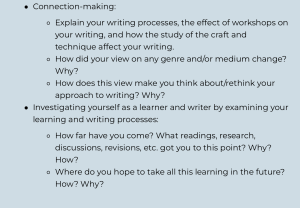15 “Reflection: We’re Always Doing It”
Kati Lewis
Lewis identifies the features of good reflective practices, such as connecting one’s writing to previous experiences and including specific details to back up one’s claims.
This chapter is one section of a six-part series on effects in writing:
- “Effects Experienced Writers Use” by Benjamin Solomon
- “The Narrative Effect: Story as Forward Frame” by Lisa Bickmore
- “The Information Effect: The Facts, The Figures, The So What?” by Lisa Bickmore
- “The Persuasion Effect: What Does It Mean to Write Persuasively?” by Benjamin Solomon
- “The Evaluation Effect: Making Judgments” by Kati Lewis
- “Reflection: We’re Always Doing It” by Kati Lewis
Reflection is a major element of creative nonfiction (memoirs, profiles, etc.), critical thinking, the scientific method, research, and really any kind of writing/creating process. This—reflection—is the element in your thinking and writing that encourages you (and your readers) to really, really make connections and meaning among the past and present, as well as to speculate on where and how you might use your learning experiences in the future.
Given all of those spaces where reflection takes place, it’s important for us to take seriously the reflective component of a project/assignment. A reflection should offer as much meaning- and connection-making as an instructor would expect in any of your pieces for the class. In fact, you’ve been prompted to participate in intentional reflection throughout the class on your semester issues, research, and writing notebook activities, lab sessions, revisions, and in your Goals & Choices statements.
As you begin rethinking and connecting your experiences in this class, it is crucial for you to consider what reflective writing entails.



Finally, it’s helpful to think about reflective writing for this class as a mash-up of genres:
- Reflection can be a memoir about your research, writing, and rewriting experiences in this class. Put another way, you’re offering your audiences the story of your learning experiences.
- Reflection can be an argument you’re making about your research, writing, and rewriting experiences in this class. Put another way, you’re offering a judgment based on evidence and criteria of how far you’ve come as a researcher and writer, as well as how far you might go in the future because of these experiences.
Often meaningful reflection, like meaningful nonfiction, offers an argument contained within the story.

